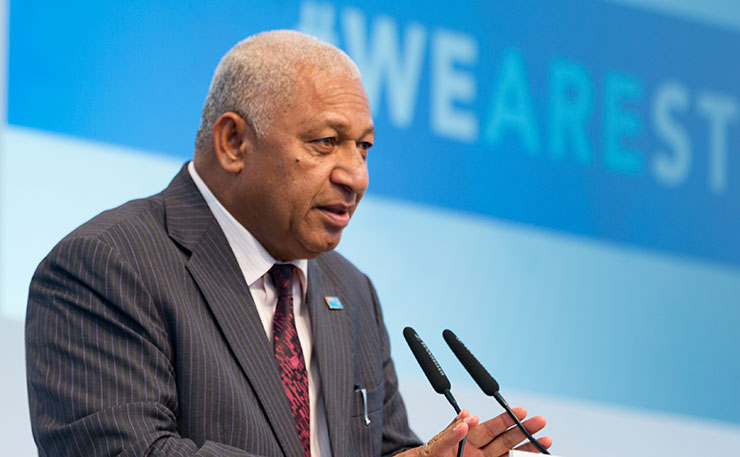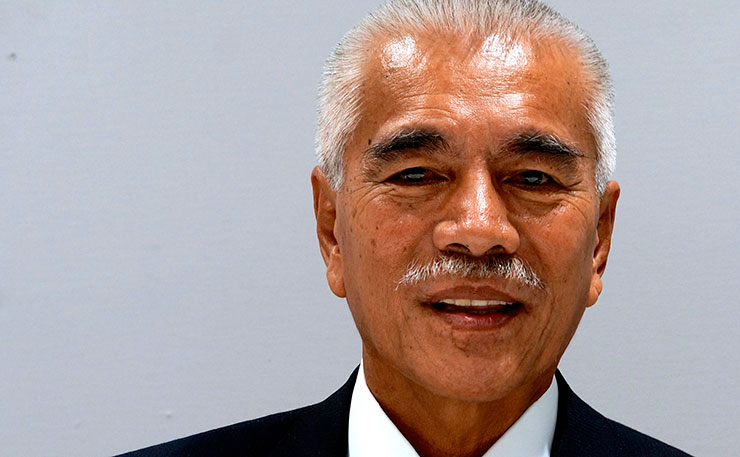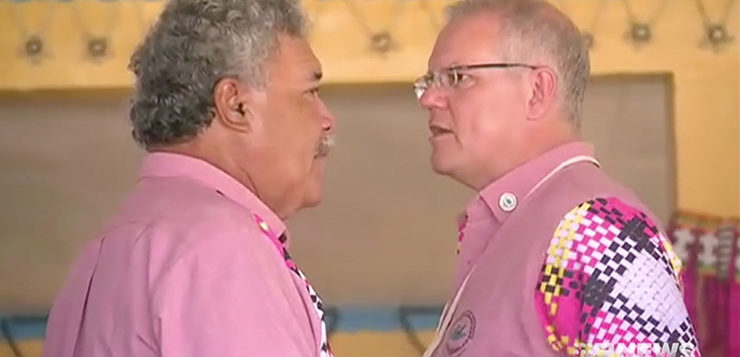DON’T MISS ANYTHING! ONE CLICK TO GET NEW MATILDA DELIVERED DIRECT TO YOUR INBOX, FREE!
Scott Morrison’s ‘Pacific step up’ has imploded, writes Ben Eltham.
Australian Prime Minister Scott Morrison flew to the island nation of Tuvalu last week. He was there for his first big foreign policy challenge: the Pacific Islands Forum.
He failed that test, miserably.
The Pacific is a geostrategic flashpoint in the rapidly escalating tension between the United States and China. Critical US bases are in our vast oceanic region, including the key air bases in Guam and Okinawa, the famous naval base at Pearl Harbour, and of course Darwin, where US Marines are now rotating regularly.
The Pacific is also is a vital region on Australia’s doorstep that we, as the regional middle power, have in recent times largely neglected.
China has also been active in the south Pacific, growing its diplomatic presence and inevitably extending its economic interests as the second largest economy in the world. This has ruffled feathers, to say the least, in the national security establishment in Canberra. China has been accused of peddling strings-attached loans to small island nations such as Vanuatu, as part of its vast belt-and-road investment binge in developing nations.
Australia’s security establishment, often represented by defence policy nerds such as Rory Medcalf and Hugh White, has been ringing the alarm on China for some time now.
The remedy to China’s moves in the Pacific has acquired official policy status and even a catch-phrase: the “Pacific step up”. The idea is to re-engage Australia’s anemic relationship with the Pacific region with more care and attention, and a big boost to foreign aid.
The Pacific step up is a foreign policy, not an economic one, let alone a climate or energy policy. It is posited on the idea that Australia’s national security will be safeguarded by recommitting to our relationships in the region. Half a billion dollars of new aid is attached.
The Pacific step up was backed all the way from the top – Morrison himself invested his own political capital. Earlier this year, the PM travelled to Fiji, where he gave a speech to the University of the South Pacific. Speaking warmly of his friendship with Fijian leader Frank Bainimarama, he made much of the “vuvale” or family relationship Australia shares with the Pacific.

“When you see yourselves as family, a relationship moves beyond a shallow transactional lens,” Morrison told the assembled dignitaries in Suva. And yet when it came to a choice for Scott Morrison between his own foreign policy objective of Pacific re-engagement, and Australia’s immutable protection of the coal industry, he chose coal.
As a result, the much-vaunted Pacific step up is dead on arrival
As veteran Pacific observer Mary-Louise O’Callaghan wrote last week, “this week’s disappointment will hit harder than most. For the island states, which have been dealing with the very real impact of climate change for more than a decade, have an acute sense of how little time is actually left to do anything meaningful about what are already for them existentially high stakes.”
In what must have been extraordinary scenes, Morrison imploded during a 12-hour meeting in Tuvalu with Pacific leaders.
If this was “family”, it was an ugly living room squabble. Morrison ruled out any movement on de-carbonising Australia’s economy, or shutting down the coal industry that is drowning Pacific states. Bainimarama was furious, unleashing a scathing attack in which he called Morrison “insulting” and “condescending”. The Prime Minister of Tonga reportedly cried.
Anote Tong, climate campaigner and former prime minister of Kirabati, said it best: “What is the relevance of Australia’s ongoing protestations in the forum?,” Tong said. “If it’s going to continue with that line, it poses a danger to the other countries in that forum.”
Tong has called for Australia to be kicked out of the Pacific Islands Forum. “How can you justify being part of a family and part of a group which you’re trying to destroy?” he told journalists.
For the Pacific islands, the equation is simple. More warming means the extinction of their nation-states. Half a billion dollars won’t change those calculations.

To a group of nations that face a real and imminent existential threat to their very landmass, Australia’s coal policies surely look like a slow campaign of annihilation. The logical action for small nations faced by a great power bully is to ally together with the regional hegemon. Australia is stupidly and unsubtly herding our neighbours into the arms of China.
It’s instructive that Morrison supposedly commissioned advice from the public service that claimed that China, as a much bigger emitter than Australia, is far more responsible for climate change than Australia. While this is technically true, it’s also highly misleading.
China’s emissions on a per head of population basis are much lower than Australia’s. And notably, China is on track to reach its commitments from at the Paris climate talks almost a decade early.
By contrast, on any analysis, Australia is a major polluter. We are one of the very worst emitters per capita on the planet and the third largest fossil fuel exporter, plus we’re a far larger emitter than New Zealand and the rest of the Pacific combined. Australia is not on track to meet our Paris commitments. Indeed, the government wants to open more coal mines and more fossil fuel industries.
Scott Morrison knows this, because he is not a stupid man. Nor could he have failed to notice the view of the Tuvaluans, who greeted incoming leaders with confronting images of children sitting in waist deep water. Morrison walked past those children, sitting in water, to march into a 12-hour meeting with allies and neighbours, in which he told them he was content for them to drown.
And yet, the entanglement of national security and climate change is not going away. The disastrous bullying of Pacific island neighbours is just a taste of the foreign policy challenges that await Australia in a radically warmer and more unstable world.
And that’s why the Tuvalu summit is so significant. Even the national security boffins can’t save Australian public policy from the debauchery of fossil fuel interests.
Tuvalu revealed that when it comes to the crunch, Australia won’t just back fossil fuel industries at the cost of the destruction of the planet, the death of natural wonders, or the flooding of neighbours. Australia will even back coal over our more narrowly-defined national security decisions, in terms of global geopolitics and competition with China. Other nations will take note, and adjust their plans accordingly.
Australia under Morrison is a bit like a fare evader on an out-of-control bus. We are loudly protesting we’ve paid for our ticket, while the bus careens off a bridge.
No wonder our Pacific island family members are terrified and enraged. Australian voters should be too.
DON’T MISS ANYTHING! ONE CLICK TO GET NEW MATILDA DELIVERED DIRECT TO YOUR INBOX, FREE!
Donate To New Matilda
New Matilda is a small, independent media outlet. We survive through reader contributions, and never losing a lawsuit. If you got something from this article, giving something back helps us to continue speaking truth to power. Every little bit counts.




